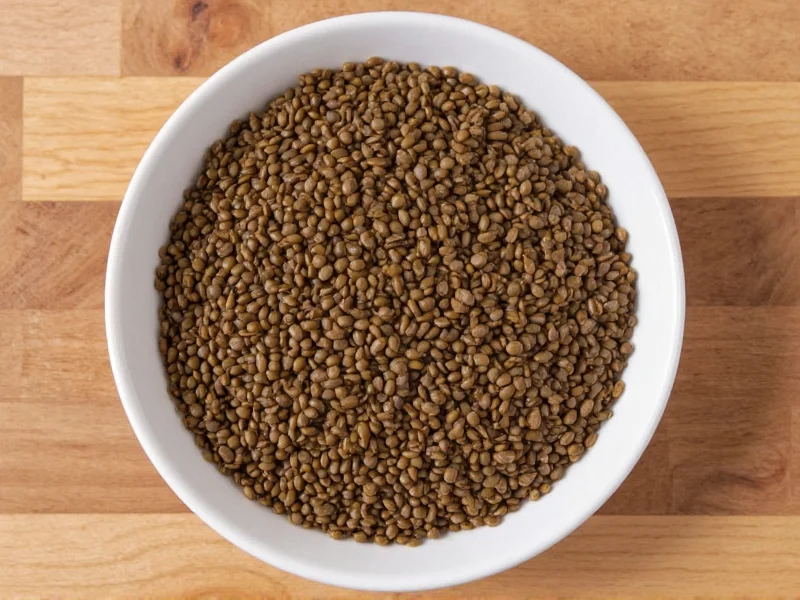To cook dried lentils properly, rinse 1 cup of lentils thoroughly and remove any debris. Combine with 2.5-3 cups of water or broth in a saucepan. Bring to a rolling boil, then reduce heat to low and simmer uncovered. Cooking time varies by variety: brown and green lentils need 20-30 minutes, red lentils 15-20 minutes, and black lentils 25-45 minutes. Check for tenderness starting at minimum time. Drain any excess liquid once cooked to your desired texture. Season after cooking for best results.
The Complete Guide to Cooking Dried Lentils Perfectly Every Time
Lentils are nutritional powerhouses packed with protein, fiber, and essential minerals. Unlike canned varieties, cooking dried lentils from scratch gives you complete control over texture and flavor while avoiding unnecessary sodium. This comprehensive guide reveals professional techniques for achieving perfectly cooked lentils regardless of variety.
Understanding Lentil Varieties and Their Cooking Requirements
Not all lentils cook the same. Each variety has unique characteristics that affect cooking time and final texture. Knowing these differences is essential for how to cook dried brown lentils versus other types.
| Lentil Type | Appearance | Water Ratio | Cooking Time | Best Uses |
|---|---|---|---|---|
| Brown Lentils | Olive brown | 1:2.5 | 20-30 minutes | Soups, stews, salads |
| Green Lentils | Pale green | 1:2.5 | 25-30 minutes | Salads, side dishes |
| Red/Yellow Lentils | Orange to yellow | 1:2 | 15-20 minutes | Dals, purees, thick soups |
| Black (Beluga) Lentils | Small, black | 1:3 | 25-45 minutes | Salads, pilafs, as caviar substitute |
Step-by-Step Cooking Method for Perfect Results
Follow these professional steps for the best way to cook dried lentils with consistent texture every time:
Preparation Essentials
Never skip rinsing dried lentils. Place them in a fine-mesh strainer and run cold water while gently agitating. This removes dust, debris, and potential small stones. Spread lentils on a light-colored plate to spot any remaining impurities—a crucial step many home cooks overlook when learning how to cook dried lentils properly.
The Cooking Process
- Combine 1 cup rinsed lentils with appropriate water ratio in a heavy-bottomed saucepan
- Add aromatics like bay leaves or garlic cloves if desired (avoid acidic ingredients yet)
- Bring to a vigorous boil over medium-high heat
- Immediately reduce to the lowest possible simmer
- Cook uncovered, stirring occasionally
- Begin checking for doneness at minimum time listed for your variety
- Drain immediately when tender to prevent overcooking
Achieving Ideal Texture: Professional Tips
Many home cooks struggle with how to make lentils not mushy. The secret lies in timing and technique:
- Never add salt or acidic ingredients (like tomatoes or vinegar) until after lentils are fully cooked—these toughen the skins and prolong cooking time
- Check lentils frequently during the last 5 minutes of cooking—they go from perfect to mushy quickly
- For salads where you want distinct lentils, undercook slightly as they'll continue softening off-heat
- If using a pressure cooker, reduce water ratio to 1:1.5 and cooking time to 8-15 minutes depending on variety
Flavor Enhancement Techniques
Seasoning properly transforms basic lentils into a standout dish. For optimal flavor development when learning how to season cooked lentils:
- Add salt only after lentils reach desired tenderness
- Incorporate acid (lemon juice, vinegar) in the last 5 minutes of cooking
- Finish with fresh herbs like parsley or cilantro just before serving
- For deeper flavor, sauté aromatics (onion, garlic, celery) before adding lentils and liquid
Storage and Reheating Guidelines
Proper storage maintains texture for future meals. Cooked lentils keep for:
- 3-5 days in an airtight container in the refrigerator
- 6 months when frozen in portion-sized containers
When reheating, add a splash of water or broth to restore moisture. Microwave gently at 50% power to prevent rubbery texture. Never boil reheated lentils as this guarantees mushiness.
Troubleshooting Common Cooking Issues
Even experienced cooks encounter problems. Here's how to fix them:
- Hard lentils after cooking: Likely old lentils or insufficient cooking time. Add more liquid and continue simmering
- Mushy lentils: Overcooking or adding acid too early. Next time reduce cooking time by 5 minutes
- Uneven cooking: Inconsistent heat or varying lentil sizes. Stir more frequently and sort lentils by size
- Bitter taste: Poor quality lentils or insufficient rinsing. Always purchase from reputable sources
Advanced Cooking Techniques
For culinary enthusiasts exploring dried lentils cooking ratio variations:
When making lentil soup, use a 1:4 water ratio for a brothier consistency. For pilafs or side dishes, a 1:2 ratio creates firmer texture. The cooking time for dried lentils in an Instant Pot reduces significantly—typically 8-12 minutes at high pressure with natural release.
Professional chefs often toast lentils in dry pan for 2-3 minutes before cooking to enhance nuttiness—a technique worth trying once you've mastered basic preparation.











 浙公网安备
33010002000092号
浙公网安备
33010002000092号 浙B2-20120091-4
浙B2-20120091-4